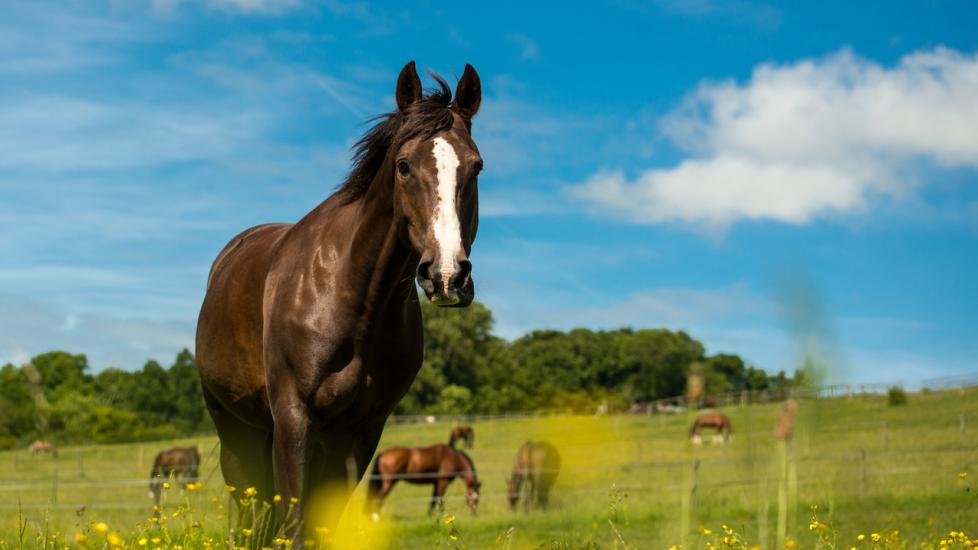Heaves in Horses
What Is Heaves in Horses?
Heaves has had many names over the years. Equine asthma is the current terminology used, but it has also been called recurrent airway obstruction (RAO), chronic obstructive pulmonary disease (COPD), and emphysema. All these names refer to the same inflammatory condition of the horse’s airways in response to allergens in the environment. Airways in the horse’s lungs overreact to the allergens causing bronchospasm (tightening of the airways) and buildup of fluid leading to cough and difficulty breathing.
There are many degrees or severities of equine asthma, and the most severe cases are described as heaves. Equine asthma is very common in milder forms but thankfully much rarer in the more severe and debilitating heaves form. Often, asthma is experienced more commonly in the spring and fall when allergens are most abundant, but it can be seen all year round. Younger horses tend to display milder cases while heaves are usually only seen in older horses.
Shop Horse Products
Symptoms of Heaves in Horses
Mild heaves symptoms include:
- Cough
- Nasal discharge
- Mild exercise intolerance
Horses with severe heaves may exhibit:
- Cough
- Nasal discharge
- Heaves line (Indentation behind the last rib caused by a severely increased respiratory effort)
- Increased respiratory rate
- Weight loss
- Exercise intolerance
It is important to note that fever is not a common symptom of equine asthma.
Causes of Heaves in Horses
Like asthma in humans, heaves are an overreaction to allergens in the environment. The most common allergens include:
- Dust
- Mold
- Pollen
These allergens are most found inside barns and stalls. Even the best quality hay can have dust and mold particles. Round bales can be major triggers because horses tend to bury their entire heads in the bales and inhale particles continuously while they eat.
How Veterinarians Diagnose Heaves in Horses
Diagnosis of heaves starts with the veterinarian taking a thorough history. The primary goal is to rule out an infection. To do this, the veterinarian will ask questions such as:
- Has the horse traveled recently?
- Are there any new horses on the farm?
- Have any other horses been showing similar symptoms?
After taking a history, the veterinarian will conduct a thorough physical exam. They will make sure the horse does not have a fever and listen to the heart and lungs. The veterinarian may perform a rebreathing exam, which involves placing a large bag over the horse’s muzzle or holding off the nostrils to block the airways. The purpose of this test is to encourage the horse to take a deep breath to make any abnormal sounds more obvious during the exam. “Crackles” over the upper (dorsal) lung fields can point towards severe and chronic heaves because it indicates more permanent changes in the lung architecture.
A complete blood count (CBC) may help to rule out infectious causes of cough in cases that are unclear. Serum Amyloid A (SAA) is a useful stall-side test that can also help differentiate between infection and allergic inflammation.
A bronchoalveolar lavage (BAL) or a transtracheal wash (TTW) can be used to sample the fluid in the lungs to determine what type of inflammation exists there to better direct treatment.
Allergy testing helps to identify the allergens causing heaves. Allergy shots can be used based on these findings, but they are often expensive and may not be effective for all horses.
Treatment of Heaves in Horses
Allergens are the primary cause of heaves, so environmental management is the number one factor in treating heaves. Without making these changes, the airways will continue to be irritated and overreact. Any medications or other treatments the veterinarian may employ will only be able to improve the symptoms. Making environmental changes early and sticking to them can help prevent a horse with mild equine asthma from progressing to severe heaves.
Horses with heaves need to be kept outside as much as possible. Removing round bales is imperative and steaming or soaking hay to decrease allergens is ideal.
Additional treatments can include bronchodilators such as clenbuterol or albuterol, which can help to decrease bronchospasm and open the airways. These are best used when the horse will be outside or just before riding.
Antihistamines like ceterizine and hydroxizine can be helpful, but in more severe cases, steroids including dexamethasone and prednisolone may be needed to temporarily decrease inflammation.
Inhalers and nebulizers help to deliver medications directly to the lungs. These treatments are very effective but often too expensive for most owners to consider.
Recovery and Management of Heaves in Horses
Most horses with mild cases of equine asthma can recover fully if proper environmental changes are made. Some moderate cases may require antihistamines or occasional short courses of steroids during the spring or fall, but horses may generally return to full work with no significant long-term issues.
True, severe heaves cases typically require chronic management and horses often have difficulty returning to any degree of significant exercise. These horses are at higher risk for secondary infections and laminitis because they often need to be on steroids for long periods of time.
Heaves in Horses FAQs
Can horses recover from heaves?
Yes, horses can recover from heaves if they are managed properly. Eliminating the source of inflammation is the most important factor in their recovery.
How long can a horse live with heaves?
Horses can live long and productive lives when their heaves symptoms are managed properly.
References
- House, Amanda. American Association of Equine Practitioners. Recurrent Airway Obstruction (RAO) in the Horse. Reviewed 2016.
- PennVet. University of Pennsylvania. What's a ‘Heave-y’ Horse? August 2013.
Featured Image: iStock.com/SazzyB
